Matt Rees's Blog, page 29
February 2, 2010
Palestine Scene of the Crime
 Crime writer J. Sydney Jones has a new blog called Scene of the Crime. He aims to interview writers about the impact on their writing of the location and sense of place in their novels -- usually from far-flung countries. This week he features me on my Palestinian crime novels. Read on, for the full interview.
Crime writer J. Sydney Jones has a new blog called Scene of the Crime. He aims to interview writers about the impact on their writing of the location and sense of place in their novels -- usually from far-flung countries. This week he features me on my Palestinian crime novels. Read on, for the full interview.A Different View of Palestine
Matt Beynon Rees has staked out real estate in the Middle East for his acclaimed Crime Writers Association Dagger-winning series of crime novels featuring Palestinian sleuth Omar Yussef. The books have sold to publishers in 23 countries and earned him the title “the Dashiell Hammett of Palestine” (L’Express).
His newest, The Fourth Assassin, which is out on Feb. 1, finds Yussef in New York for a UN conference and visiting his son, Ala, who lives in Bay Ridge, a Brooklyn neighborhood with a large Palestinian community. Of course murder and mayhem greet Yussef in New York, just as in Palestine, and he is ultimately forced to investigate in order to clear his son of a murder charge.
Scene of the Crime caught up with Matt in New York, where he is promoting his new book. He was kind enough to take time away from his busy schedule to answer a few questions.
Describe your connection to Jerusalem and Palestine. How did you come to live there or become interested in it?
I arrived in Jerusalem for love. Then we divorced. But I stayed because I felt an instant liking for the openness of Palestinians (and Israelis). When I arrived I had just spent five years as a journalist covering Wall Street. Frankly that exposed me to a far more alien culture than I experienced when I became a foreign correspondent in the Middle East. People in the Middle East are always so eager to tell you how they FEEL; on Wall Street no one ever talked about feelings, just figures. Rotten material for a novel, figures are. I’ve lived now 14 years in Jerusalem.
What things about Palestine make it unique and a good physical setting in your books?
Palestine is a place we all THINK we know. It’s in the news every day. Yet the longer I’ve been there, the more I understand that the news shows us only the stereotypes of the place. Terrorism, refugees, the vague exoticism of the muezzin’s call to prayer. What better for a novelist than to take something with which people believe themselves to be familiar and to show them how little they really know. To turn their perceptions around. The advantage is that I begin from a point of some familiarity – it isn’t a completely alien location about which readers know nothing. Imagine if I’d set my novels in, say, Tunisia or Bahrain. Not far from where my novels take place, but much more explanation needed because they’re rather a blank. With Palestine, I’m able to manipulate and disturb the existing knowledge of the place we all have.
Did you consciously set out to use Palestine as a “character” in your books, or did this grow naturally out of the initial story or stories?
I arrived in Jerusalem as a journalist, but I’ve felt that I’m on a vacation every day of those 14 years I’ve lived there. Every minute I spend in a Palestinian town or village, my creative senses are heightened, to the point where it becomes quite exhausting. Part of that is because of the people, the way they speak and feel. But most of it is the experience of place. The light so bright off the limestone. The smells of spices and shit in the markets. The cigarette smoke and damp in the covered alleys. It’s important to note that each Palestinian town is extremely distinctive – which might not be evident from the news. My first novel takes place in the historic town of Bethlehem. The second is in Gaza, which seems like another world. Nablus, where the third book is set is an ancient Roman town, built over by the Turks. …My new novel sees my Palestinian detective Omar Yussef come to Brooklyn. I move him around BECAUSE place is the driver of the novels. The main characters are the same; but I draw something different out of each of them by shifting them to new places.
How do you incorporate location in your fiction? Do you pay overt attention to it in certain scenes, or is it a background inspiration for you?
The texture of a Palestinian town is so rich, it ends up defining the atmosphere of the novel. With the casbah of Nablus for example: I was stuck in its old alleys during the intifada with gunfire all around, not knowing who or what might be round the next corner, and it seemed so sinister and beautiful at the same time. The locations are more than background. They’re significant because I write about Palestinian culture and society and people, in the context of a mystery. You couldn’t take my mysteries and change the names and put the Golden Gate in the background and say they were set in San Francisco. They’re the books they are because Palestine is as it is.
How does Omar Yussef interact with his surroundings? And conversely, how does the setting affect him?
Omar Yussef, my detective, is based on a friend of mine who lives in Dehaisha Refugee Camp in Bethlehem. It’s important to me that he should be a Muslim, someone who loves his traditional family life and tribe, someone who belongs very deeply to Bethlehem. That’s because I’m trying to show readers what they’re missing when they see the Palestinians only as stereotypical terrorists or victims. His reaction to the chaos around him is that of an honorable man who finally is driven to stand up against the negative forces at work in his town.
Has there been any local reaction to your works? What do local Palestinian and Israeli reviewers think, for example. Are your books in translation in Palestine, and if so, what reaction have they gotten from reviewers?
Hanan Ashrawi, a former Palestinian peace negotiator and a leading political figure, said of The Collaborator of Bethlehem that “it reflects the reality of life in Bethlehem– unfortunately.” (After all, it’s a crime novel of exceeding chaos.) I get a lot of emails from Arabs noting that I’m showing the reality of their people in a way that isn’t reflected in Arab media – which just blames Israel for everything – or in Western media, where the Palestinians are usually just stereotypes set in opposition to Israel. Translation into Arabic is a slow business – Henning Mankell sold 40 million books before he got an Arab translation last year – but I’m hopeful. Meanwhile the first book was translated into Hebrew and got good reviews. Israelis were very glad to have an opportunity to learn about life beyond the wall that they’ve built between Jerusalem and Bethlehem.
Of the novels you have written set in Palestine, do you have a favorite book or scene that focuses on the place? Could you quote a short passage or give an example of how the location figures in your novels?
In my third novel. The Samaritan’s Secret, there’s a scene in an old palace in the Nablus casbah called the Touqan Palace. This was the real palace I discovered on my first visit to the West Bank (to cover the funeral of a man who’d been tortured to death in the local jail). I finished my reporting and went for a walk about the casbah. I’d heard about the Touqan Palace and a friendly Palestinian helped me find it. We shouldered open the door, climbed through the goat pen inside, and came into a courtyard strung with cheap laundry and with chickens living in the ornate fountain at the center. The wealthy family that built the palace had moved to a new place up the hillside; now the palace was home to poor refugees. It struck me very powerfully as a political irony. But I also loved the stink of the chickens and the way the goats nuzzled at me and the children who lived there came through the dust to chat with me. I tried to get that feeling of a people estranged from their history into the novels through Omar Yussef, who’s a sleuth but also a history teacher. So the scenes in the Touqan Palace are quite pivotal, thematically, for me.
Who are your favorite writers, and do you feel that other writers influenced you in your use of the spirit of place in your novels?
I love Paul Bowles (The Sheltering Sky, Let it Come Down). He used to travel the Arab world and, each day, would incorporate into his writing something that had happened the previous day as he journeyed. That’s a technique I’ve used. It makes you look sharply at the emotions you experience when you’re in a strange place. In some ways it was most useful when I wrote The Fourth Assassin, which is set in Brooklyn. I know New York very well but I made a great effort to see the place as a new immigrant or a total foreigner might. I discovered that it was daunting and oppressive and crowded and huge and threatening and cold as hell – it actually made me a little depressed. Which was the point of doing my research that way. I think of it as method acting for writers.
Visit Matt at his homepage, and also on his blog. Thanks for the insightful comments, Matt, and good luck with the new book.
Published on February 02, 2010 07:09
•
Tags:
bethlehem, brooklyn, crime-fiction, exotic-fiction, gaza, golden-gate, interviews, israel, j-sydney-jones, jerusalem, matt-beynon-rees, middle-east, nablus, new-york, omar-yussef, palestine, palestinians, san-francisco, the-fourth-assassin, writing
February 1, 2010
Bringing the Mideast to America
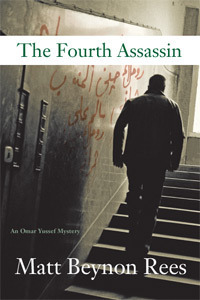 Often a novelist can humanize foreign affairs in ways a journalist can't.
Often a novelist can humanize foreign affairs in ways a journalist can't.To mark publication today of my new Palestinian crime novel The Fourth Assassin, I posted this for my regular column on GlobalPost.
Though we do so at our peril, overseas events are convenient to ignore. We turn past the foreign pages of the newspaper. We might not even get a passport or voyage further than Florida for vacation.
But if we ignore the world beyond our borders, one day that world will come to remind us that it’s there. That’s what happened on 9/11 and in the terror attacks in Madrid and London.
Readers of GlobalPost by definition understand this — it’s why they’ve come to a site which now covers the globe as almost no other U.S. news organization does. Many readers, however, don’t know what important world news they’re missing.
That’s why I decided to bring my fictional Palestinian detective Omar Yussef to the U.S. in my new novel, which is set in Brooklyn. To remind American readers that the Muslim world exists, and that Westerners need to understand how Muslims think. The politics of the Muslim world isn’t just restricted to the Middle East and Asia; it’s in our own towns.
In “The Fourth Assassin,” Omar Yussef comes to New York for a U.N. conference. He visits the Bay Ridge neighborhood of Brooklyn, which these days is becoming known as “Little Palestine” because of the steady influx of immigrants from the West Bank.
Little Palestine isn’t a community of Palestinian intellectual emigres of the kind that emerged in most major Western capitals during the 1970s. It’s a new wave of mostly young men who come to drive taxis and work several jobs, until they can afford to bring their families over to join them. Theirs is the typical American immigrant story, in fact. Except for the FBI investigations.
After 9/11, the FBI cottoned to the fact that there were Palestinians in Bay Ridge. According to community leaders and Brooklyn media, agents went into Little Palestine, recruiting their own operatives and coming away with alleged links between prominent local Palestinians and violent groups back home, such as Hamas.
The Bureau didn’t uncover any broad conspiracy in Little Palestine. But its actions added to the tension between New Yorkers and local Arabs after the attack on the Twin Towers. That’s the situation into which I wanted to place Omar Yussef, a Muslim with an often unconventional political take. Mutual distrust makes for a good crime novel. It also happens to be real.
The conflict between the West and the Muslim world today is much like the Cold War of decades past. I’d wager that few people read the nonfiction written about the confrontation with the Soviet Union any more. But some of the best fiction about that time, say John Le Carre’s Smiley novels or books like Martin Cruz Smith’s “Gorky Park” which went deep into Russian society during those years, still speak to us even though that battle is long finished.
That’s because those books examine a time of conflict in a timeless way. By humanizing all the participants in the conflict, those novels go beyond nonfiction and give us a window into the minds of those people who’d otherwise seem to us inhuman enemies. I hope “The Fourth Assassin” does that, too.
When Omar arrives in Bay Ridge, he finds a headless body in his son’s bed. The gruesome discovery leads him to uncover a suicidal assassination plot that seems to involve some of his former pupils in his school in Bethlehem. One of the suspects: his own son.
Much of what goes on in the novel stays within the Palestinian community, most of which came from the village of Beit Hanina on the border between Jerusalem and Ramallah. These immigrants fled the violence of the intifada and, over the last decade, moved into a neighborhood that had traditionally been Norwegian and Irish.
These days Little Palestine is dotted with basement mosques, Arab restaurants and boutiques selling slinky headscarves for religious Muslim women who want to observe the signs of their faith while also highlighting their beauty.
But the novel also takes Omar to Atlantic Avenue and Coney Island — iconic areas of Brooklyn we might be more accustomed to seeing in traditional thrillers, though they now have strong Arab presences. I put those locations into my novel so that readers would understand that the politics of the Middle East can’t be isolated. You can take the N train from Times Square and get off in Palestine.
I hope “The Fourth Assassin” will help readers understand that.
Published on February 01, 2010 06:16
•
Tags:
matt-beynon-reees, middle-east, new-book, new-york, omar-yussef, palestine, publication-date, terrorism, the-fourth-assassin, ttle-palestine, twin-towers, united-nations
January 25, 2010
New meaning to Israel 'domestic issues'
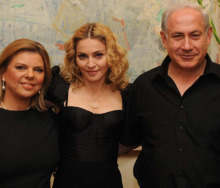 Billions of dollars in aid, bulging frequent-flier accounts for U.S. diplomats, and several thousand dead ought to be proof enough that the Middle East peace process has churned through the last decade and a half without getting anywhere.
Billions of dollars in aid, bulging frequent-flier accounts for U.S. diplomats, and several thousand dead ought to be proof enough that the Middle East peace process has churned through the last decade and a half without getting anywhere.But if you need more evidence, here it is: The Israeli Prime Minister’s wife is still allegedly yelling at her housekeeper.
When I first came to Jerusalem in 1996, Benjamin Netanyahu had just been elected to lead Israel for the first time. The Oslo Peace Process had been derailed by the assassination of Prime Minister Yitzhak Rabin and a spate of Hamas suicide bombings. And all was not, apparently, well in the Netanyahu home.
One of the first articles I wrote was for a British tabloid, The Daily Mail. It told the sad tale of a young South African girl who alleged that Netanyahu’s wife, Sara, screamed at her for burning some soup, and that this was part of a long process of verbal abuse during her six months of employment. Another former nanny emerged to allege that she had been half-starved while working for the Netanyahus, being allowed one tomato a day and an egg every two days.
Fast forward to the second term of Bibi, as he’s known, now approaching the end of its first year. The Prime Minister has pulled the wool over the eyes of the White House with a tendentious promise to freeze building in Israeli settlements. Things are quiet in the West Bank, thanks to Palestinian complacency and large amounts of U.S. aid.
But they are not so quiet in Netanyahu’s swank villa in Caesarea, an ancient town on the Mediterranean coast and home to many of Israel’s richest people. (It has the country’s only golf course. Say no more.)
Lilian Peretz, 44, filed a lawsuit in the Tel Aviv Labor Court last week alleging that she was frequently humiliated by Sara Netanyahu. The suit claims Sara commanded Peretz to shower several times a day to maintain a “sterile” environment in the villa and would call her with complaints at all hours — once phoning her at 2 a.m. to tell her a pillow had been incorrectly covered.
Peretz claims she was paid below minimum wage throughout her six years with the Netanyahus and was forced to work on the Jewish Sabbath, despite being a religiously observant Jew. The family’s bottled water was barred to her, so she had to make do with drinking from a faucet.
Her suit demands $80,000 in compensation, back pay and emotional damages.
The Prime Minister’s office said this week the lawsuit was “full of lies and defamation,” and that it was part of a campaign by Netanyahu’s political rivals to turn attention from his politics (which he thinks are rather successful) to his lifestyle (which, as a man with two homes and a penchant for cigars, is rather more luxurious than that of the average Israeli voter.)
The Israeli public first heard about the suit in a screamingly large front-page headline in the country’s biggest newspaper. “Sara abused me, humiliated and exploited me,” the Yediot Aharonoth newspaper announced in revealing Peretz’s allegations earlier this month.
The legal content of the suit is perhaps less interesting to most Israelis than its allegation that Sara is a little unbalanced and that she shouts down her staff, the prime minister’s staff and Bibi himself daily. According to Peretz, Sara refers to herself as “the mother of the nation.”
Last week, Peretz complained to her local police station that she had received a threatening phone call from a man who told her to “end this whole thing in 12 hours, [or:] you will be harmed personally. This comes from Bibi.”
The prime minister’s office said the call certainly didn’t come from Bibi.
During Netanyahu’s first term, his family life was often in the news. Sara, a former flight attendant who is now a psychologist, was accused by former staffers of abusing them and of excessive demands for cleanliness in handling the couple’s two sons.
In his years out of office, Netanyahu says privately, he learned many lessons about how to handle leaks from his cabinet and the demands of squabbling politicians. Until last week, he’d also learned how to keep a lid on potential controversy surrounding his third wife.
But Israeli politics is always more complex than it looks. In this case, the relentless promotion of Peretz’s case by Yediot may have more than just a bit to do with a fierce circulation war the newspaper is fighting with a free daily that backs Netanyahu.
Certainly it’s an opportunity for those who oppose the prime minister’s policies to get in a jab or two. In the Maariv newspaper, columnist Ben Caspit wrote that Bibi ought to resign.
“The fact that he permits that problematic woman [Sara:] to decide, to appoint, to fire, to upset, to dictate and to apply pressure on organizations in their entirety renders him unfit” for office, Caspit wrote.
The criticism of Netanyahu is somewhat disproportionate, given the manner in which Israeli politics is generally conducted — it’s riven with corruption, egotism and public speeches which are little more than grandiose hissy-fits. If Caspit thinks the behavior of a politico’s wife disqualifies him from the public’s trust, perhaps he hasn’t looked at how Israel’s politicians behave. That’s the real unbecoming conduct.
I posted this on Global Post.
Published on January 25, 2010 09:32
•
Tags:
benjamin-netanyahu, caesarea-jerusalem, hamas, israeli-media, israeli-politics, lawsuit, nanny, netanyahu, sara-netanyahu, the-daily-mail, yediot-aharonoth, yitzhak-rabin
January 24, 2010
Matt Rees NY book reading Feb. 2
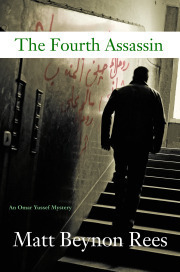 Award-winning crime writer Matt Beynon Rees reads from THE FOURTH ASSASSIN, his new novel, Feb. 2 in New York.
Award-winning crime writer Matt Beynon Rees reads from THE FOURTH ASSASSIN, his new novel, Feb. 2 in New York.The fourth installment in Matt's Crime Writers Association Dagger-winning series about Palestinian sleuth Omar Yussef is published Feb. 1. In New York for a UN conference, Omar uncovers an assassination plot. The suspect: his own son. Omar's most personal investigation so far.
Matt will read from the book Feb. 2 at 7 p.m.
Location: Partners & Crime bookstore, 44 Greenwich Avenue (note, it's on Greenwich Avenue, not Greenwich Street), in Greenwich Village, NYC
Matt Beynon Rees is the award-winning author of the Omar Yussef series. A prize-winning journalist, he has reported for 14 years from the Middle East for Time, Newsweek and British newspapers. His novels have been translated into 23 languages. He lives in Jerusalem.
Read more about THE FOURTH ASSASSIN. Watch a video about the book. Order it from amazon.com or from amazon.co.uk. For publicity contact Grace McQuade (212) 446-5101 gmcquade@goldbergmcduffie.com
Published on January 24, 2010 04:00
•
Tags:
book-tour, brooklyn, crime-fiction, crime-writers-association, greenwich-village, matt-beynon-rees, new-york, omar-yussef, palestine, palestinians, partners-and-crime, readings, the-fourth-assassin
January 21, 2010
Back to diplomacy school for Israel
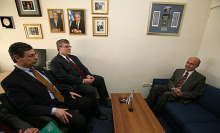 JERUSALEM, Israel — The American humorist Caskie Stinnett once wrote that “a diplomat is a person who can tell you to go to hell in such a way that you actually look forward to the trip.” In other words, someone who doesn’t make his meaning so clear that one is both afraid of the trip to hell and angry about being sent there.
JERUSALEM, Israel — The American humorist Caskie Stinnett once wrote that “a diplomat is a person who can tell you to go to hell in such a way that you actually look forward to the trip.” In other words, someone who doesn’t make his meaning so clear that one is both afraid of the trip to hell and angry about being sent there.Which makes Israel’s two top “diplomats” rather less than diplomatic.
Deputy Israeli Foreign Minister Danny Ayalon caused turmoil in relations with Turkey last week when he decided to upbraid the Turkish ambassador. Ayalon and his boss, Foreign Minister Avigdor Lieberman, wanted to let the Turks know that they found it unacceptable that a Turkish TV drama portrayed Israeli agents kidnapping children and the Israeli ambassador’s assassination.
Ayalon kept the Turkish ambassador hanging around in an anteroom, in front of cameras from two Israeli news channels. When he brought him and the cameras into his office, he sat the unfortunate envoy in a low sofa and perched stony-faced on his own, much higher chair. Between them on the coffee table stood a single Israeli flag about the size of a pocket handkerchief.
Then he turned to the cameras and said, in Hebrew: “Pay attention that he’s sitting in a low chair and we’re higher up, and there’s no Turkish flag here, and we’re not smiling.” The cameramen suggested a handshake. “No,” said Ayalon. “That’s the whole point.”
In the Oxford Dictionary I keep on my desk, “diplomacy” is described as “skill in managing international relations; adroitness in personal relationships, tact.” Perhaps Ayalon, who’s always been rather charming and intelligent when I’ve met him, ought to keep a copy on his desk. Maybe he put it in the drawer with the little Turkish flag he stands on the coffee table, when he isn’t trying to show the Turkish ambassador that he’s angry with him.
The following day, the Turkish ambassador spoke out in an interview with an Israeli newspaper. “How could he be so rude?” he said.
That was essentially the reaction in Israeli newspapers, whose journalists are no fans of Foreign Minister Lieberman, an indelicate former night-club bouncer whose burliness and Moldovan birth make him — in the eyes of the press — rather unqualified to tread the minefield of politesse that is international diplomacy.
Ayalon issued an equivocal apology after a day. But the Turks insisted on a fuller apology, which came after the Turkish president said Ankara might recall its ambassador.
“I wish to express my personal respect for you and the Turkish people,” Ayalon wrote to the Turkish ambassador, “and assure that although we have our differences of opinion on several issues, they should be discussed and solved only through open, reciprocal and respectful diplomatic channels.”
On the same day Ayalon told the Israeli parliament that because of his protest “Israel is respected more.” Presumably he means that the Turks will be satisfied with the apology but will tread more carefully in the future lest their representative find himself sinking into a low chair without a nice Turkish flag to cling onto.
Why do relations with Turkey matter so much to Israel, and why did things get so bad this week?
Turkey is a major client of Israel’s defense industries. Despite the diplo-spat, Defense Minister Ehud Barak is in Turkey for an official visit during which he’ll discuss some important new military contracts. Last month Turkey said it’d push ahead with a $190-million deal to buy drones from Israel Aerospace Industries.
Some Israeli commentators believe Lieberman and Ayalon, whose party Israel Our Home sits uncomfortably in the cabinet alongside Barak’s fractious Labor Party, engineered the tension to embarrass the defense minister.
More likely Lieberman had had enough with Turkish vilification of Israel. That began a year ago, when Turkey was one of the most outraged opponents of the war Israel waged on Hamas in the Gaza Strip. The reaction back then included a surprisingly undiplomatic outburst at the economic conference in Davos, when Turkish Prime Minister Recep Erdogan berated Israeli President Shimon Peres and stormed off the stage because the host told him it was time to end the panel and go to dinner.
Since then, Israeli diplomats maintain, Erdogan has missed no opportunity to lambast Israel. In Lebanon last week, Erdogan argued that Israel’s nuclear capability ought to be treated the same way as Iran’s nuclear program, and also said Israel threatens “world peace.”
The Israeli diplomats say the Turkish TV show was the last straw for Lieberman and provided a veiled way of punishing Erdogan for his aggressive statements.
In which case, it was actually quite diplomatic.
GlobalPost
Published on January 21, 2010 23:40
•
Tags:
avigdor-liebermann, danny-ayalon, dipolomacy, foreign-minister, foreign-relations, global-post, israel, journalism, middle-east, recep-erdogan, shimon-peres, turkey
Everyone comes back to Jerusalem
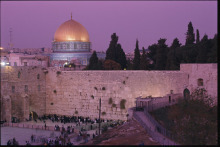 Everyone comes back to Jerusalem. I don’t know why, for the life of me I really don’t.
Everyone comes back to Jerusalem. I don’t know why, for the life of me I really don’t.It’s much too hot. The people can be offhandedly mean, and they drive as though they want to kill you. It isn’t a very pretty place once you look close. Oh and, yes, sometimes it gets violent. With jaw-dropping self-obsession, it thinks the eyes of the world are turned admiringly upon it all the time.
Jerusalem sometimes seems like that inexplicably popular idiot everyone liked in high school. Exerting a stupefying magnetism over people with otherwise solid judgment.
I’ve been in Jerusalem 14 years. I’m under no illusions as to what keeps me here. I’ve made a good life for myself with good friends, and the place provides me with the material for my writing.
But I’m rather immune to its other supposed charms. It’s no Tuscany.
Yet all my journalist pals have come and gone – and come back again. I’ve been here so long, everyone to whom I’ve said goodbye ends up dropping in for dinner once more. It wouldn’t happen if I went back to live in Wales. No one is drawn there with idealistic visions of its sublimity…
I spoke to a writing group in the center of Jerusalem last week. Lovely people the lot of them. Mostly young Americans or Canadians, Brits and South Africans who’ve immigrated recently to Israel and want to get together with writers of a similar background. All of them so devoted to Jerusalem.
To some degree, each of them has to live here a while to see beyond the newness. They’re experiencing the same happiness I recall when I arrived at university and discovered a kind of freedom and belonging I’d only before imagined. Until then, they’ll write about Jerusalem in the tones of the biblical psalmist, making of the city a personified lover, the object of desire and devotion.
That isn’t how I see the place. I’ve lived through an intifada, seen Jerusalem mangle the bodies of its peoples and accept the spray of hateful slogans on its walls. I’ve been called all kinds of names by all kinds of people and sued by some particularly unreasonable ones. I’ve come close to being run down on crosswalks by angry Israeli drivers and shoved aside in the Old City by angry hashish-raddled Palestinians.
For a while all that made me angry too. Not so angry that it overcame the feelings of creativity it gave me. There’s a certain anger – spun forward and made pro-active, positive – at the heart of Omar Yussef, the hero of my Palestinian crime novels.
Why didn't I keep on getting angry? Because I discovered I liked the hash-tokers of the Muslim Quarter rather better than I enjoyed the company of the politicians or professional classes I met as a journalist.
That’s one of the main reasons I write crime novels about this place. Crime novels are the opposite of idealization. They see “the skull beneath the skin,” as Eliot wrote of John Webster (a playwright I recommend to anyone who likes a bit of morbid, cynical straight-talk).
It isn’t that I take a negative view of Jerusalem and its environs. I long ago realized that I continue to live here because there’s something I like about it, and its people. Just not in a romanticized way. It’s simply because I’ve come to understand the ways in which the people and their city push each other to the edge of existence. It’s when they’re on the edge that I find out what really counts for them.
And for me.
(I posted this today on International Crime Authors, a joint blog I do with some other...well, crime authors, obviously.)
Published on January 21, 2010 01:36
•
Tags:
arabs, bible, crime-fiction, islam, israel, israelis, jerusalem, jews, journalism, muslims, palestine, palestinians, psalms, writing
January 19, 2010
In new Palestinian crime novel NYC dangerous as West Bank
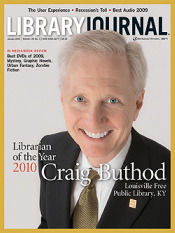 In the current Library Journal, my new Palestinian crime novel, THE FOURTH ASSASSIN (out Feb. 1) gets a good review that highlights the themes and implications beyond the resolution of the mystery. For those who have no copy of the magazine (in which case you may have missed Librarian of the Year -- Way to go, Craig Buthod of Louisville, Ky.) here's THE FOURTH ASSASSIN review: "In New York City for a UN conference, Omar Yussef goes to Bay Ridge, Brooklyn, home to a large Palestinian community, to visit his son and finds a beheaded body in his son's apartment. With no alibi, his son is arrested, and Omar finds that the streets of New York are as treacherous and dangerous as those of Bethlehem. VERDICT Journalist Rees's fourth Omar Yussef outing (after The Samaritan's Secret) exposes the political struggle among various Palestinian factions and demonstrates why it is so difficult to find a solution in the troubled region. His sleuth might miss the ancient streets of Bethlehem, but the hatred and tension of the Middle East follow the Palestinian wherever he goes."
In the current Library Journal, my new Palestinian crime novel, THE FOURTH ASSASSIN (out Feb. 1) gets a good review that highlights the themes and implications beyond the resolution of the mystery. For those who have no copy of the magazine (in which case you may have missed Librarian of the Year -- Way to go, Craig Buthod of Louisville, Ky.) here's THE FOURTH ASSASSIN review: "In New York City for a UN conference, Omar Yussef goes to Bay Ridge, Brooklyn, home to a large Palestinian community, to visit his son and finds a beheaded body in his son's apartment. With no alibi, his son is arrested, and Omar finds that the streets of New York are as treacherous and dangerous as those of Bethlehem. VERDICT Journalist Rees's fourth Omar Yussef outing (after The Samaritan's Secret) exposes the political struggle among various Palestinian factions and demonstrates why it is so difficult to find a solution in the troubled region. His sleuth might miss the ancient streets of Bethlehem, but the hatred and tension of the Middle East follow the Palestinian wherever he goes."
Published on January 19, 2010 05:37
•
Tags:
bay-ridge, bethlehem, brooklyn, crime-fiction, kentucky, library-journal, louisville, manhattan, matt-beynon-rees, middle-east, mystery-fiction, new-york, omar-yussef, palestinian, reviews, the-fourth-assassin, the-samaritan-s-secret, u-n
January 14, 2010
Writer is pro-Palestinian and pro-Israeli
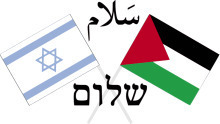 The best thing about moving from journalism to fiction writing is that people show you more respect.
The best thing about moving from journalism to fiction writing is that people show you more respect.As a journalist covering a troubling issue like the Israel-Palestinian conflict, I was often subject to rather nasty verbal attacks during public speaking engagements. For a partisan of either side, I seemed a fine target for their generalized contempt—they thought journalists were all against them and here was a live reporter on whom they could vent their spleen.
Thankfully that doesn’t happen now that I’m the author of a series of Palestinian crime novels. I wasn’t sure that it would be different, but it turns out that there’s a big change in the way people behave toward me.
Here are two examples from the last week alone.
In Cologne, Germany, last week, I talked in a bookstore at the invitation of the Cologne-Bethlehem Association. Much of the audience was made up of middle-aged and older Germans who visit Bethlehem frequently and have made strong ties with the people there.
One older gentleman suggested that, because my first novel THE COLLABORATOR OF BETHLEHEM shows the corruption and extortion carried out by the gunmen of the town during the intifada, my book “tended toward Israeli propaganda.”
But the old fellow was very respectful and as I answered him I could tell he was listening. (My response, of course, is along the lines of “No, actually the book doesn’t even address whether or not it’s right to shoot at Israelis; the book concerns itself with the negative effect those gunmen had WITHIN Palestinian society.”) Listening’s something that was often evidently not happening when, as a journalist, I would talk to audiences.
Then this week I went to the Israeli settlement of Efrat in the West Bank. I’ve visited many times before to write news reports about the confiscation of land or the endless pressure from Washington to stop building in the settlements. This time I was invited by the Gush Etzion Book Group, a few dozen women who live in the local settlements.
There had been quite some fiery debate within the group about whether to have me come and speak to them. Indeed, someone hinted that certain members of the group had stayed away.
Nonetheless, I was glad to be there. After all, much of THE COLLABORATOR OF BETHLEHEM takes place in the village of Artas and the Dehaisha Refugee Camp, which abut the northern reaches of Efrat. I want very much to talk about my books with people who have a stake in the Israeli-Palestinian struggle. Provided they’re willing to listen respectfully, to examine what I’m actually saying and not what they think I’m saying (or what they wish I’d say.)
The evening in Efrat went well and, in fact, much of what we talked about was how little I’m interested in politics—despite the apparently political subject-matter of my novels. What interests me is “the life that remains when politics is sluiced away like the filth a stray dog leaves in the street” (that’s a line from my sleuth Omar Yussef in THE FOURTH ASSASSIN, the next of my novels, which will be published Feb. 1).
Such respectful treatment is a big contrast to situations I encountered as a journalist. Then I would look out over audiences which seemed to be entirely red-faced and with arms crossed over every chest. The hostlie body language didn’t change, even though I was essentially saying the same things I’m saying now. Partisans hate journalists and, I believe, many of them used somehow to detest that I had found a kind of personal peace in covering the very conflict that stirs them up and stresses them so.
In Cologne and Efrat, people heard what I had to say and understood that I’m pro-Palestinian and pro-Israeli. I'd like all the people I know here to have a good life, not the violent situation they suffer. Politics makes people choose sides, and I want no part of that.
I also think choosing sides makes for rather bad novels. It’s in the shades of gray, where decisions are so difficult or even impossible to make, that a novel becomes truly compelling--think of Graham Greene’s best novels. Political journalism on the other hand is, to say the least, dreary. Think of the glib rubbish turned out by columnists who have to fill three op-ed spaces each week.
Who would you respect more—Graham Greene or G. Gordon Liddy? See what I mean?
So I’ll continue to talk about my books to anyone who’ll take the time to read them, because that in itself is a sign of respect and openness. Those, after all, are the qualities most needed by both sides of the Israeli-Palestinian conflict if they’re ever to find peace.
(I posted this first on a joint blog I write with some other international crime writers.)
Published on January 14, 2010 23:21
•
Tags:
bethlehem, book-groups, cologne, crime-fiction, efrat, fiction, g-gordon-liddy, graham-greene, gush-etzion, international-crime-authors-blog, israel, israelis, journalism, koeln, matt-beynon-rees, mystery-novels, omar-yussef, palestine, palestinians, politics, settlements, settlers, the-collaborator-of-bethlehem, the-fourth-assassin, west-bank
January 13, 2010
Guardian: Top 10 Arab-world novels
"The Arab literary world and Western publishing don't cross over much. The literature of the Arab world is largely unknown in the west, and even westerners who write about Arabs are sometimes seen as fringe, cult writers. That comes at a cost to the west, because literature could be such an important bridge between two cultures so much at odds. What we see of the Arab world comes from news reports of war and other madness. Literature would be a much more profound contact.
"I live in Jerusalem and write fiction about the Palestinians because it's a better way to understand the reality of life in Palestine than journalism and non-fiction. The books in this list, in their different ways, unveil elements of life across the Arab world that you won't see in the newspaper or on TV."
Published on January 13, 2010 23:17
•
Tags:
abdulrahman-munif, ala-al-aswany, algeria, arab, arab-fiction, arab-novels, british-newspapers, cairo, egypt, emile-habiby, ibrahim-nasrallah, iraq, israel, kanaan-makiya, lawrence-durrell, middle-east, naguib-mahfouz, palestine, palestinians, paul-bowles, tariq-ali, the-guardian, yasmina-khadra
The "Palestinian Mandela"?
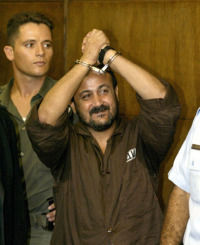 Marwan Barghouti, serving five life sentences in an Israeli jail, is a key sticking point in negotiations between Israel and Hamas over kidnapped soldier Gilad Shalit. (I posted this on Global Post.)
Marwan Barghouti, serving five life sentences in an Israeli jail, is a key sticking point in negotiations between Israel and Hamas over kidnapped soldier Gilad Shalit. (I posted this on Global Post.)The most important man in Palestinian politics is neither president nor prime minister. He doesn’t shuttle between meetings at the U.S. ambassador’s residence and the Israeli foreign ministry. In fact, he doesn’t go anywhere. He’s in an Israeli jail.
Marwan Barghouti, 50, is serving five life sentences handed down by an Israeli court for the murders of a number of Israelis and a foreigner between 2000 and 2002. Though Barghouti was a leader of the Fatah faction of the Palestine Liberation Organization, the rival group Hamas is demanding his release in return for the freedom of Gilad Shalit, an Israeli soldier kidnapped and held in the Gaza Strip.
The release of Barghouti, who’s sometimes called “the Palestinian Nelson Mandela,” is a key sticking point in negotiations between Israel and Hamas over Shalit. Israeli officials are prepared to free hundreds of Palestinian prisoners, including many who killed Israelis in terror attacks. But Barghouti is among a coterie of senior Palestinian politicians Israel doesn’t want to give up.
Why is that so important? Because many Palestinians see Barghouti as a leader who can reunite them, at a time when they’re deeply divided — Fatah against Hamas, Gaza against the West Bank, pro-Iranian against pro-U.S.
A fluent Hebrew-speaker, he has a record as favoring the old Oslo peace accords with Israel, while refusing to eschew violence, which he regards as the right of an occupied people. That makes many Palestinians feel he’d lead them toward peace with a firmer hand than their current leadership, which they often see as weak in the face of American pressure and apparent Israeli intransigence.
Could Barghouti do it? Well, this tiny, bustling, barrel-chested charmer had the power to break the Palestinians apart with the second intifada. Perhaps he retains the street cred to do the job in reverse.
Most journalists explain the onset of the intifada’s violence in 2000 with tales of faltering peace talks or “provocative” visits to the Aqsa Mosque compound by then-opposition leader Ariel Sharon. I’d sum it up differently. With two words: Marwan Barghouti.
When Yasser Arafat returned to govern the Palestinians in 1994, he divided his leadership. The “Outside” leaders, who returned from decades in Lebanon and Europe, sewed up all the best jobs in the ministries and the security establishment. With disdain, Palestinians called them “the Tunisians,” after their last place of exile.
The “Inside” leadership, in turn, felt cheated. They had lived through the occupation and been jailed during the tough years of the first intifada, which they, after all, had headed and which had been the point of pressure that led to Israel’s willingness to make a peace deal at all.
Barghouti headed the Inside leaders. Born in Kobar, this small, welcoming village in a glen near Ramallah, he co-founded the Fatah youth movement in his teens, was first arrested by Israel at 18, and was key to the first intifada, which began in 1987. (He was deported to Jordan by the Israelis and coordinated the intifada from there.)
This gave him greater support among ordinary Palestinians, who knew and respected him, as opposed to the unknown or, at best, distant figures of the Outside leadership. Yet, under the Oslo Accords, leaders like Barghouti were stymied. Arafat put Outsiders in control of all the cash, jobs, and favors.
Outside the Palestinian parliament in Ramallah in November 1997, I chatted with Barghouti alone. He made some remarks that I simply scribbled in my notebook and attributed to a combination of bluster, bluff and sour grapes.
“The Inside leadership still feels they don’t have what’s coming to them,” Barghouti told me in his rapid speech. “Former intifada leaders, who were very important, are nothing now. Not one of them is in the leadership of the Authority. The people who lived through the intifada will insist on freedom. As a result, maybe the intifada will be renewed, but maybe this time with more violence.”
In the end, Barghouti became so disenchanted with Arafat’s regime that, when violence broke out in September 2000, he took hold of the uprising and used it to bring the entire Oslo edifice crashing down on Arafat’s regime. His thinking: If Oslo were destroyed, the Outside leaders would lose their power and Arafat would have to turn to Barghouti.
His comments outside the Palestinian parliament came back to me, and in the early days of the intifada I understood why the Israelis and Palestinians had been engulfed in violence that eventually cost thousands of lives: Arafat didn’t handle Barghouti right.
The Israeli prime minister at the start of the intifada, Ehud Barak, understood that. In talks with Arafat just before he was defeated by Sharon in February 2001, Barak demanded that the Palestinian chief rein in Barghouti, who was leading bloody, daily demonstrations at Israeli checkpoints. Barak later said that Arafat turned to his aides, shrugging: “Who does he mean? Who’s he talking about?” said Arafat, who simply didn’t want to discuss his upstart rival, according to Barak.
Barak later described Arafat’s reaction as “bullshit.” It was. Arafat knew Barghouti’s importance better than anyone.
The reason Israeli leaders balk at Hamas’s demand for Barghouti’s release is because they know it, too.
Published on January 13, 2010 06:56
•
Tags:
ehud-barak, fatah, gilad-shalit, intifada, israel, marwan-barghouti, palestinian-politics, palestinians, plo



